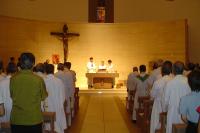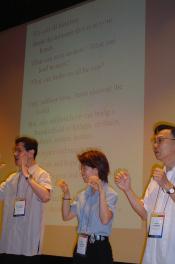|
Posted Sunday, August 22, 2004 at
12:45 p.m. CDT
A
time of rest in preparation for concluding activities
“As this assembly comes to a close we are
confirmed in the
conviction that the family is truly God’s gift and blessing to
Asia.”
By THOMAS C. FOX
Daejeon, South Korea
After six
days of discussions aimed at giving guidance to family members and
building pastoral programs to help hurting families, participants in
the eighth plenary session of the Federation of Asian Bishops’
Conferences took a day off.
 |
|
FABC
participant gather in chapel as Cardinal Shan Kuo-hsi, bishop of
Kaohsiung, Taiwan concelebrates. |
Sunday’s program called for visiting
Korean parishes, shopping for some, and rest for others.
Earlier in the weekend, FABC assembly
participants discussed the finishing touches on a message of hope
they expect to issue to Asian Catholics and all other people of good
will. It proclaims the family as “as truly God’s gift and blessing
to Asia.”
“As this assembly comes to a close we
are confirmed in the conviction that the family is truly God’s gift
and blessing to Asia,” the bishops’ message stated.
It is customary
at the end of each plenary gathering that participants issue two
documents. The first is a message to the general public. It deals
with the subject of the gathering and it often aims at being
encouraging. This year’s theme was family life. The second statement
is longer and emerges from the direct deliberations of the weeklong
gathering. This year’s final paper, written for bishops and other
Catholic pastoral leaders, runs more than 30,000 words. It will
receive its final approval Monday, the last day of the assembly.
This FABC
plenary assembly has drawn more lay participants than any previous
gathering, according to assembly organizers. The move was
intentional in that the subject was family. Many delegations brought
lay consultants. The initial draft of the working paper was
completed last January. It was then mailed to the various national
conferences. It was at that point that some conferences had
consultations with the laity. Early this summer, in Deajeon, a group
of Asian lay leaders gathered to draw up their own paper on family.
That was mailed to each of the national conferences.
 |
|
Many general
assemblies begin with song. Song leaders led the audience with
hand gestures and music to get them in the proper mood for a
day's work. |
In all, 181 participants came from 22
Asian countries. These included six cardinals, 24 archbishops, 56
bishops, as well as priests, religious and laity.
All general
assemblies, workshops and discussion groups included until the last
day mixed clergy and laity. It was only on the last day that some
bishops suggested they wanted to have at least one session for
bishops only.
This year’s
plenary assembly message celebrates family life and values as a sign
of hope in Asia. It states that Asian family life upholds values and
traditions as hope to the wider world. These include reverence for
life, closeness to nature, strong bonds, personal relationships,
hospitality, respect or elders, filial piety, and care for the
young.
In addition to
celebrating Asian family values, the bishops’ message marvels at
“how the values of indigenous peoples and other religions have
enriched Asian families.” It goes on to state, “intercultural and
inter-faith marriages have generally been a source of blessing to
many in spite of the complex issues they bring.”
The statement expresses the desire by
the bishops to share the anxieties that Asian families now face.
“New realities impinge on the well-being of many Asian families, the
message stated. “An emerging global capitalist culture that propels
individualism, selfishness and greed, with lifestyles and mindsets
inspired by materialism and secularism, pose a threat to the
family.” The bishops go on to lament a “contraceptive mentality”
and the oppression of women and children.
In their
message, the bishops recommit themselves to serving families. “We
bishops will look for every opportunity, amidst all challenges and
threats, to promote the good for families.”
After a day of
rest, the bishops conclude their weeklong conference Monday when
they will officially issue their message and conference paper.
[Fox is publisher
of the National Catholic Reporter and author of Pentecost in Asia, a book
about the Asian churches. His e-mail address is
tfox@ncronline.org.]
|
Family Apostolate
and scholarships for kids |
|
At
the Tanbang-dong Parish, in Daejeon city, an hour from the FABC gathering,
conference participants visited a magnificent church, built in 1992. The
parish has three Korean priests.
In 2002 Joseph
Kyeong Kap-ryong, Bishop of Daejeon, established a "Family Apostolate".
There are some 100 couples in this movement from 40 parishes in Daejeon
City (there are 106 parishes in the Diocese of Daejeon of which 40 are in
the city.) The 300 invited participants at Mass consisted of these married
couples, all sitting as couples - on one side those with children, on the
other those without children. Most women wore white veils. After the
homily they renewed their marriage vows
In 2002 the bishop
also set up a scholarship scheme for high school kids. To be eligible
families must have 4 children or more; welcoming all children, not
discriminating between boys or girls. Until now some ten familes have been
granted scholarships - one of these families has 9 children, two families
have seven chidlren, one with six children, two with five chldren, four
with four children.
-- John Prior
|
|